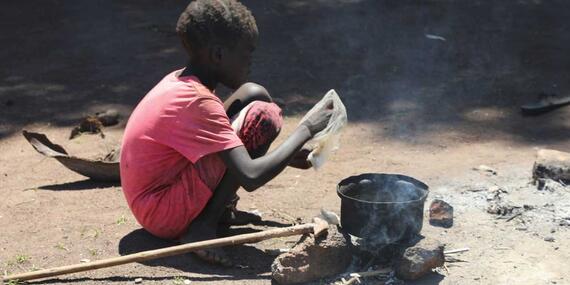Today's top news: Sudan, Ukraine, Haiti

Sudan
The humanitarian community in Sudan continues to deliver, as the conflict there enters a third month. Since 22 May, OCHA has facilitated the movement of at least 350 trucks carrying more than 14,000 tons of life-saving assistance to different locations across Sudan.
As warned yesterday by USG Griffiths in his statement, the situation in Darfur is spiraling into a humanitarian calamity, after two months of conflict in Sudan.
USG Griffiths said people in Darfur are trapped in a living nightmare, with nearly 9 million people in need of humanitarian assistance. Farmers are unable to reach their land, which further raises the risk of food insecurity. Meanwhile, aid workers face restrictions trying to deliver supplies to the region.
He also said that inter-communal violence is spreading, threatening to reignite the ethnic tensions that stoked the deadly conflict in Darfur two decades ago. He stressed that the world cannot allow this to happen again.
Parties to the conflict must refrain from attacking civilians and civilian infrastructure and must take constant care to spare them throughout their military operations. USG Griffiths urged the parties to allow those seeking to flee to do so safely and voluntarily. He also urged them and those with influence to ensure the movement of humanitarian supplies and personnel from other parts of Sudan – and from neighbouring countries – to Darfur.
Next week, the UN Secretary-General Antonio Guterres will open Monday’s high-level pledging event for Sudan and the Region. He will be speaking virtually to the conference, which is being held in Geneva in hybrid session starting at 3 p.m. local time. The event is being co-organized by OCHA, UNHCR, Egypt, Germany, Qatar, Saudi Arabia, the African Union and the European Union.
OCHA and its partners encourage donors to give generously to help meet spiraling humanitarian needs resulting from the conflict in Sudan and the flow of refugees into neighbouring countries.
Ukraine
The response to the Kakhovka Dam destruction continues. Today, OCHA, the UN Children’s Fund and the World Food Programme were in a small village in the rural area of the Kherson region, about 15 kilometers from the front line.
They used boats to deliver life-saving water and food to around 500 families who have been enduring constant bombardment followed by catastrophic flooding.
Aid efforts continue in other affected areas. Since 6 June, humanitarian partners have delivered, through at least 10 inter-agency convoys, vital items to thousands of people affected by the disaster, in addition to the regular assistance provided separately by UN agencies and NGOs.
The destruction of the Kakhovka Dam has depleted the Kakhovka Reservoir. This is affecting tens of thousands of people who had already lost access to piped water in the south of Ukraine.
The reservoir – one of the largest in Europe and a source of drinking water for at least 700,000 people – has reportedly lost 70 per cent of its capacity, according to Ukrainian authorities.
Large urban areas in Dnipropetrovska oblast are completely cut off from centralized water and while others have extremely limited access. This has left more than 210,000 people in urgent need of life-saving water, according to estimates from the United Nations and our humanitarian partners.
While preliminary analyses satellite imagery from UN Satellite Center shows that flood waters are receding, the crisis is far from over.
Saving Lives: Addressing the Urgent Food Security Needs of Haiti
This morning, the Economic and Social Council held a special meeting on the theme, “Saving Lives: Addressing the Urgent Food Security Needs of Haiti.”
At the event, Edem Wosornu, the Director of Operations and Advocacy for the Office for the Coordination of Humanitarian Affairs, noted that, today, nearly half of all people in Haiti need humanitarian aid and protection, with two out of five people are going hungry.
The 2023 humanitarian appeal for Haiti seeks $720 million to help more than 3 million people – over half the population, but she voiced concern that the plan is currently just over 20 per cent funded.
Ms. Wosornu said the aid community has assembled a humanitarian negotiation team to facilitate our ability to reach people in need and is working with many parts of Haitian society for the sole purpose of helping us negotiate with armed gangs so we can reach those most in need.
In the absence of a political solution or better security conditions, she said that the humanitarian community has scaled up its operations so it can deploy urgent resources, including by sending in our most experienced personnel and setting up systems to broaden our reach and to ensure more efficient and timely humanitarian action.
